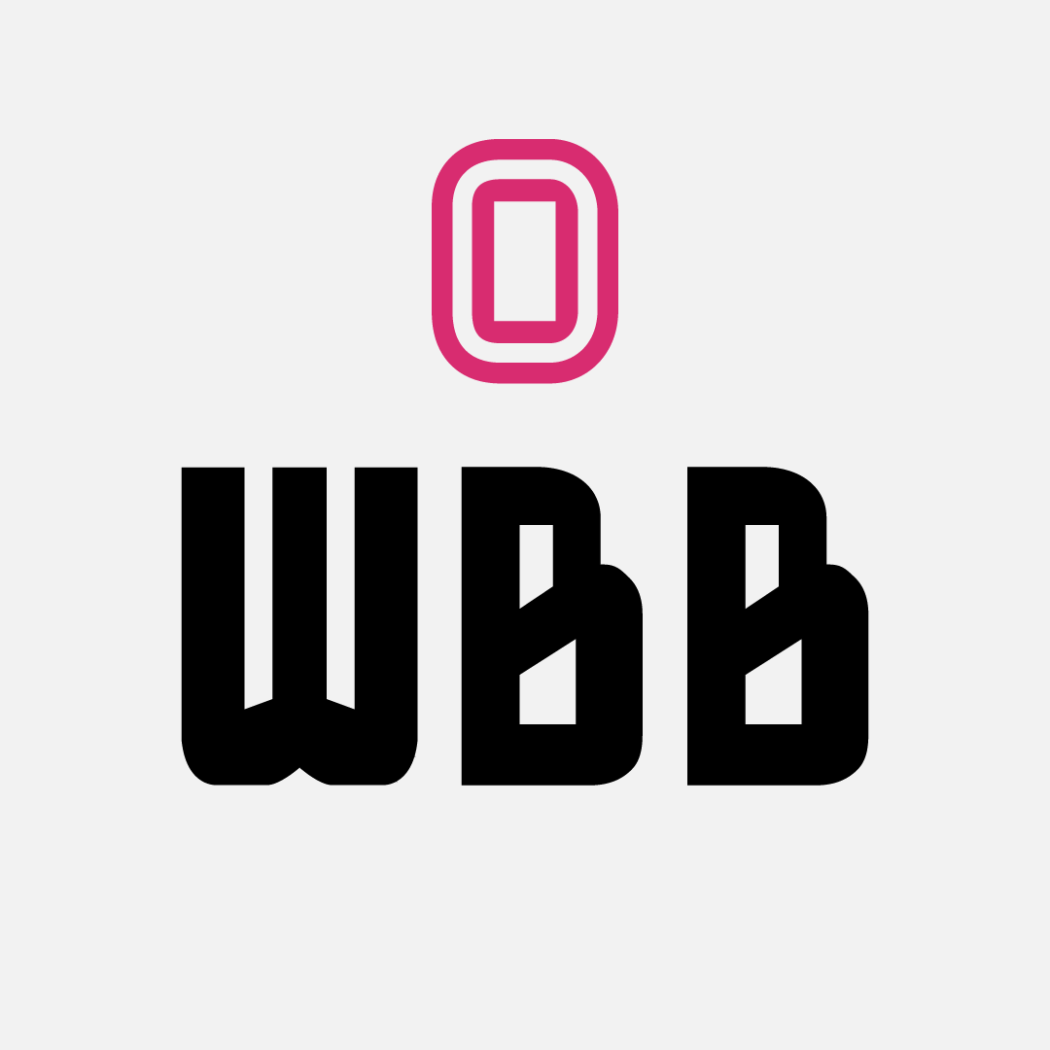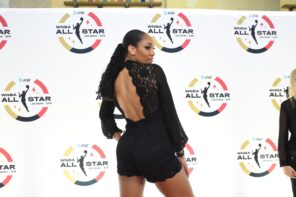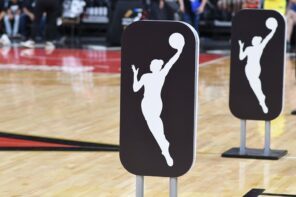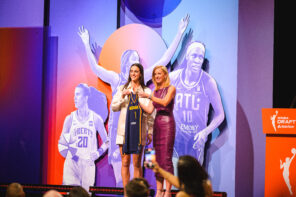On any given day, you can scroll through Instagram and see highlights of some of the most incredible young athletes across the globe. If you’re a regular in the world of women’s basketball, you’ve probably noticed that some of last year’s widely circulated viral videos feature young female hoopers all across the country. Whether you’re watching Stanford-bound Fran Belibi catch an alley-oop and dunk on rival high school players, or discover Toni Harris make her way to becoming the first female position player to received a full college football scholarship, you probably discovered these young ladies on Overtime.
Founded in late 2016 by Dan Porter and Zack Weiner, Overtime is focused on the interests and passions of young, digitally-savvy sports fans. Its programming focuses on high school athletes with exceptional talents, offering those athletes a platform to tell their own stories. A few months ago, we officially announced Overtime’s acquisition of She Hoops Network, originally founded by former hooper turned entrepreneur, Marcus Crenshaw (link to this feature can be found HERE). The result of this union is Overtime WBB, the latest endeavor to come from the sports media giant.
We had the chance to get into a great conversation with Overtime co-founder Zack Weiner and Chloe Pavlech, Talent and Digital Content Manager, about the launch of Overtime WBB and what fans can expect from this exciting addition to Overtime’s programming.
BTW: It seems very fitting that today, as we celebrate National Girls and Women in Sports Day, is the day that you decided launch Overtime WBB. Was that planned or did it just happen to be a coincidence?
CP: It was planned. We originally had talked about it last week about what date, and when Zack actually mentioned that today would be a great day for it, I was like, “Oh my God, how fitting.” So, we kind of planned it out perfectly. Obviously today is all about expanding opportunity and so we thought that today would be the perfect day to launch Overtime WBB.
BTW: First, for our readers who may not be familiar with Overtime, Zach can you give us a little bit of a background on your brand?
ZW: Overtime is a source for the next generation, the up and coming sports fans. We wanted to create a sports media company that they can really identify with and that they feel a sense of ownership over. One of the biggest ways we do that is by focusing on up and coming athletes. So, let’s take the 15-year old high school kid, whether it could it be in basketball, football, soccer, e-sports. We really view covering those kids and telling their stories as really essential to what the next generation of fans want to see, want to hear, because those athletes are so relatable. We create short-form content, we create highlights, we have our own technology set to do that, and we also do longer-form storytelling and shows. We reach about 35 million people every single month and we do about half a billion video views. So, we reach quite a bit of that next generation that we want to target. I’m really excited to have Overtime WBB as part of that and to extend both our content set and our audience.
BTW: Before we get into today’s launch, we’ve got to take it back a little bit to talk about the whole acquisition of She Hoops Network. Zack, what attracted you to She Hoops, and what different things factored in your decision to invest in that company?
ZW: I think its a few things. I was actually thinking about this today. One of the things that really stood out about She Hoops was the authenticity. If you look at the captions that Chloe writes and the way that she relates to the actual player and the way that she interacts with the fans in the comment section and all of that. To me, it’s actually very similar to Overtime. We don’t really have to make a transition in terms of the voice because the voices are so lined up, and that’s honestly what made the acquisition so easy. What made it so appealing really was sort of the breadth of players that Chloe and her team have been able to cover. I also think it was the consistency. She has done a really great job creating stars in the women’s basketball world or at least helping to create stars. Overtime, by nature, is very aspirational, so that’s something that we definitely want to tap into with Overtime WBB. I think the last thing – or one of the last things too – was that we felt the resources that we have could be really well-utilized by Chloe and the brand. A lot of the things that we do are perfect to implement with Overtime WBB.
BTW: Chloe, you were a part of She Hoops and transitioned with the company to Overtime. Share a little bit about your time working with Marcus Crenshaw and the team at She Hoops and how has your experience helped you now that you are spearheading this new endeavor?
CP: Yeah, I think Zack’s done a really great job as far as crediting Marcus with, kind of, really being at the forefront of changing the women’s game. When I think about the basketball side of things, you think about accounts like Overtime, where there has always been a space for guys’ highlights, and guys’ stories, but there hasn’t necessarily been a space for girls. So, when Marcus started this a few years ago, that was his idea. He was like obviously this is something that girls would want too. So, he took it and ran with that and kind of told me about the idea, and I was like, “Oh, my gosh, I’d definitely love to be a part of it and help.” Marcus has been a mentor to me and someone who just really believed in me as far as being talent and just having really good ideas. One thing he told me was that not to be a broadcaster, just to be that player – the player like you were in college in terms of really relating to people.
The Overtime voice, as Zack mentioned, relates on both ends, and we really got a chance to showcase a lot of girls that people wouldn’t know about. When I think about She Hoops Network, we were probably at 140,000 for two years and originally our vision was that we wanted everyone in the women’s basketball community to know what She Hoops Network was. However, when we talked to Zack and Dan, they were like, “What about growing the audience, letting everyone know about the women’s game?” And that’s when we realized that Overtime could really take women’s basketball to new heights – just in terms of the coverage that they could help us with and just having different ideas. At She Hoops, there weren’t that many people there. With Overtime, there’s a company that’s growing over time. You have more and more people who have a vision, who can really help, and who actually really believe in the game. When Marcus first told me about Overtime, I was worried that the women’s basketball piece would get lost in it. But Zack and Dan were great, and said “No, we’re all about women’s basketball. We think that the game is really growing. We think people are going to be really attracted to it.” We just want to help build a bigger platform and give young girls a chance to dream and to be able to be as big as some of these young stars that are boys.
ZW: Yeah, and Chloe just spoke this. I think the integration has been super-seamless and really fun to be honest. I think that both goes in terms of our accounts and how it, sort of feels out that audience, like, Overtime will be re-sharing Overtime WBB, like all that stuff has been really seamless. Also, literally having Chloe be integrated into the team has been awesome. I’ve seen her bounce ideas off of our content team, and even today, we were talking about having WBB merchandise and stuff like that. So, integrating that brand and women’s basketball in everything that we do. Obviously, it’s going to be a process. On day one, we’re not going to able to fully do it, but over time, the potential of that I think is really exciting.
BTW: Let’s dive into the star of the show, the Overtime WBB brand. What kind of content can fans, whether they’re diehard basketball fans, young people, or people who are just interested or open-minded to getting into women’s basketball – what kind of content can we expect from this new chapter in your company?
ZW: I’ll let Chloe mostly answer this, but we’ll certainly have more expanded and consistent coverage. We have a technology that allows us to capture highlights in real time, we’ve been doing this in high school basketball for the past two years. We’ve been able to cover a lot of kids and really start to put them into the national spotlight. Our plan is to leverage that technology and those resources to do that in the women’s game. I think that that’s really exciting. The other core piece is the storytelling.
CP: I can speak on some of it too. So, one of the big things obviously, as you know, is that we’ve been covering highlights this whole time. But if you think about it, up until this past fall, all of our coverage for the original She Hoops Network was all everyone else’s coverage. We weren’t able to actually be at these girls’ games. We were just pulling it from other outlets. Now, as Zack was saying, we have people stationed at all of these different games to cover the top girls in the country. So, when I think about it now, someone like a Fran Belibi – the girl that’s been catching alley-oops, dunks—she is the future of women’s basketball. One thing about her that a lot of people didn’t know is that she’s only been playing basketball for three years. She started playing basketball when she was 15. So, just being able to help tell someone else’s story besides given them the actual coverage because we want to work on a lot of long-form content. For example, we just recently did a piece on a Muslim-Somali girl named Jamad Fiin. When we found the original piece, we put it on, at the time, what was She Hoops Network, and then she blew up after that. Then Zack had the idea that we should go a little bit deeper into the Muslim community and to really tell their stories because a lot of people don’t know that the game is progressing with them in terms of basketball. Jamad is really the first person we’ve seen, but obviously the Muslim community has been very active in the women’s game. Just being able to bring and highlight a story like hers and to just really show these young athletes in a deeper setting and show them who they are outside of just basketball because that’s what’s been the biggest thing. One of the biggest things for me, and obviously with the LeBron James stuff, you’re more than an athlete. I feel like athletes have a chance to tell their stories now. Probably the best part about Overtime WBB is that these young athletes that are girls will be able to share their stories as well, and that way, grow the fan base and women’s basketball. We’re hoping that this starts really at the grassroots level with high school, and transitions all the way through the high school level because you’re able to cover them for so long.
BTW: Chloe, if you could just talk a little bit about your role and your day-to-day looks like. Are you solely responsible for spearheading this, or do you have a team?
CP: My title is Talent and Digital Content Manager, and there’s a whole team at Overtime. Like I said before, at She Hoops Network, there was only a few people. Now at Overtime, there’s a whole team of people that are helping me. My day-to-day job includes finding highlights, different social stories, and managing people who cover these young athletes for us. My day-to-day responsibility is helping find different highlights, looking through trending stories throughout the day about women’s basketball. For instance, obviously, the biggest news yesterday was Maya Moore and then just different things that are happening in the high school and the college level. Stories like Shakyla (Hill) getting two quadruple-doubles and different things like that that people may not know about the women’s game, but are really cool. Obviously when you have a team of people that can help go through a bunch of stuff about women every single day and be at the forefront so we can help put it out, it’s phenomenal and makes my job a lot easier.
BTW: What is your long-term vision for Overtime WBB? Let’s say, five years from now, what would you like this to turn into?
ZW: In my opinion, Overtime WBB has the potential to be bigger than all Overtime is right now. There’s just so many incredible stories and so many kids out there and we’ve really only scratched the surface. And as time goes on, we’ll be able to put more and more resources into Overtime WBB. I really view it as a thing where five years from now, there’ll be tons of kids we’ll be able to cover on a consistent basis and that identify with the brand, that feel empowered and inspired by Overtime WBB. I hope that we can actually have an impact on the game, but I think that that takes time to have like a true, true impact. I think that Chloe and Marcus already have had that impact with She Hoops and we’re just looking to build on that in the next few years and beyond.
CP: When I think about it, women’s sports have obviously been underrepresented for years. With Overtime WBB, we see it as more of a chance to really give the sports coverage that women, I think, have deserved for such a long time now, starting with basketball. It starts here at the ground with basketball, but, we want that to translate to all women’s sports. I know we’re kind of getting ahead, but if you think of what Overtime did by acquiring She Hoops Network – this is probably, I’d say, well I think it is the first sports digital media network that has adopted a women’s platform. Yes, Overtime did it now, but now I see, once people start realizing their success, and there is obviously a market for the women’s game, then other companies are going to start trying to start a women’s sports platform just solely dedicated to women. Overtime really took a chance on it and you see how well it’s growing. My vision is that other people will realize that, “Wow, the women’s game is really cool. We should be doing this too.”
BTW: So, at Beyond The W, we’re trying to focus on the culture aspect of women’s basketball – what makes it unique, what makes it different, the pulse of it, like, what makes different than any other league, any other sport in the world. How would you define the culture of women’s basketball? What does it look like to you? What does it mean and feel like to you? And how do you think Overtime is helping to push that culture forward?
CP: So, I think what the women’s basketball culture needs right now is – and that’s why I love Overtime for hiring me – the culture needs players that either no longer play the game or whoever has played the game. The culture needs them to stay a part of the game and to be able to help and to give ideas on how to grow the game. It’s great that you have all these people that have ideas, but, one thing that I think can really make the game special is for former players to chime in with what they wish they would’ve had or what else we could be bringing. One thing about the WNBA that was really cool is when I was at All-Star, I would ask questions that they weren’t necessarily familiar with hearing. I think about someone like you, Laureen, who you said, you didn’t have any journalism experience, but you wanted to be involved with it. When you did, you had a really great time because you understood just how special it was that you were there and just how powerful it is. Once you do start following the women’s game, you fall in love with it. All WNBA players say, “Just come to one game, and if you don’t like after one game, I’ll give you your money back.” And if you do go to one game, you do fall in love with it because of just the purity of the sport. When we talk about the culture, you know, one thing that I think is really hard is – ESPN isn’t going to cover everything. They cover a lot of stuff, but that’s one place where Overtime WBB really picks up. We cover so many different things that you won’t see on ESPN and we’re able to really relate to that younger audience and give them a vision. My biggest thing is seeing people and hearing from people that look like you. We want these girls to look at Overtime WBB every day, and say, “Oh my gosh! This is what I want to be like, this is who I aspire to be.” Especially when we start covering more and more WNBA players. That’s a scenario where I think Overtime has a distinct advantage because we have that type of access.
ZW: I’d like to add that what we’ve seen on the men’s side is just a lot of trendsetting, all the way up to the NBA. I think we’re starting to see that on the women’s side, but that is something that I really, really want to see more of and I think that we can contribute to that. What is Maya Moore wearing to a postgame conference? What sneakers are the players wearing? All the stuff around the game and the culture really resonates with our audience and I think that’s the place where we can also differentiate our coverage of women’s sports in the same way that we do with the rest of the stuff that we do.
CP: Laureen, think about WNBA Kicks, right? Just how much that page has blown up just because that is part of the culture –shoes. All the different designs that people wear and just different things. Like Zack said, what these players are wearing, what they’re doing. These professional players, they set the culture, and they set the tone for the rest of women’s basketball – for the college players and the young players.
BTW: You’re right Chloe! One major factor that has contributed to, both the success of She Hoops, and the success of WNBA Kicks, is that the players buy in. The players want this kind of coverage. One thing that I’ve realized with the players is that they know who’s there genuinely and who’s there just to get a quick story. If they see that what you have is interesting and cool, they will buy in. They will support you. They will follow you. They’ll share your content. The players are probably the most accessible players I’ve seen to date in any professional sport versus other major sports where you have to go through a million and one people just for them to even request to have them even look at your content or speak to them or to try to create a story around them. It might go through multiple hands and it may stop at the first hand it gets into. The player actually would’ve probably be very interested, but it’s getting through all the middlemen first. Whereas in the WNBA, you tag someone and they’ll probably retweet it, share it, and thank you for it.
ZW: I think that our voice has a lot to do with the format that we use. There’s a show that we have called “Lie Detector”, where we hook up these athletes to a fake lie detector, and get them a little nervous, but in a fun way. It allows us to, sort of, disarm them and get a real view and make them really relatable to our audience. So, from everything that we do, the language we use, the format, the kids that we cover, everything is about making these athletes more relatable, and giving them that platform to really show their true selves. I think that that, again, is something that really differentiates us from some of these other legacy media companies.
(Follow Overtime WBB on Instagram: @OvertimeWBB)
(Follow Chloe on Twitter: @CPav15)




